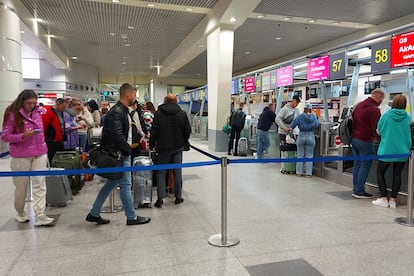Prices of flights out of Russia soar after Putin announces mobilization
Uncertainty about the scope of recruitment and the lack of ways to leave the country is causing concern among citizens. Some air routes have sold out their tickets


The Russians are still coming to terms with the fact that the war in Ukraine is not something being fought by others, and that the decisions of their leader, Vladimir Putin, also affect them. The partial mobilization decree that the president signed this Wednesday has caused confusion and panic among many Russians. As hours passed, there were fewer and fewer options to leave the country.
Flights out of the country quickly sold out as citizens assimilated the Russian leader’s message. Barely an hour after Putin addressed his citizens for the first time since the beginning of the offensive, to tell them that some of them would be forced to go to the front, flights for Wednesday from the Russian capital to Turkey, Azerbaijan and Armenia had sold out. After a few hours, there was no longer the possibility of traveling in the next few days, not even to other destinations where Russians do not need a visa, such as the countries of Central Asia.
Siberian Airlines had sold out all its flights from Moscow to Dushanbe, the capital of Tajikistan, until September 26. Tickets from other Russian cities were available, but the few left were selling at prohibitive prices. Flying from St. Petersburg to the capital of Armenia cost 193,000 rubles, more than €3,000 at the exchange rate.
Russians will also not be able to leave the country through the Baltic states. As a result of the war in Ukraine, those nations decided to close their borders to all Russians, even those who have a Schengen visa for the entire European area. “Latvia will not issue humanitarian or other visas to Russian citizens who avoid mobilization,” warned Latvian Foreign Minister Edgars Rinkevics.
Major Russian carriers, including flag carrier Aeroflot, as well as Russian Railways (RZHD), say they have not been instructed to stop selling tickets abroad to potential reservists. “I have a military file, although I did not serve. I bought a ticket with Aeroflot yesterday and they did not ask me anything, not the reason for the trip, nor how much money I have, so more or less as usual,” said a 34-year-old man, whose testimony was shared by a Telegram channel created at the beginning of the war to help citizens leave the country.
Putin’s decree has caused much confusion due to its vagueness. The text does not specify who will be called by the Army, and part of the task will fall to each regional government. “I think that the mobilization only affects those who have military experience,” a citizen who preferred to remain anonymous told this newspaper. Many thought that the call from the recruitment offices would only reach veterans of conflicts like Syria, but the the legal text is worded, anyone who has done their military service could be summoned.
There is little information available. A platform of lawyers and human rights activists, Call to Conscience, recalled that current Russian legislation protects people “whose beliefs or religion are incompatible with military service” so that they can apply for civilian alternatives to military service. “This also applies to the mobilization period,” the organization added in a statement.
The news had been so unexpected that the Moscow Stock Exchange collapsed more than 10%. The wave of panic was reminiscent of the first days of the offensive in Ukraine. Thousands of Russians then left the country fearing that the border would be closed and they would not be able to escape. However, a large part returned later due to a false sense of calm and because they did not have the means to live abroad.
The same thing is happening now with the mobilization announcement. The spokesman for the Russian president, Dmitri Peskov, has warned that the draft will not be instantaneous and that the 300,000 soldiers that the Defense Ministry says it wants to mobilize could be called in the future, so any fleeing Russians could be mobilized on their return. In addition, the State Duma approved on Tuesday a series of amendments that include jail time for those reservists who do not respond to their summons.
Likewise, the decree was approved with one point, the seventh, completely deleted from the document. Peskov did not explain its content and limited himself to promising that the number of reservists will not be higher than the one announced by the authorities. On March 5, Putin assured that they would resort to “neither conscripts nor reservists.” “They are not and will not be employed in this military operation. Our Army will resolve all the tasks that arise,” he said back then.
Tu suscripción se está usando en otro dispositivo
¿Quieres añadir otro usuario a tu suscripción?
Si continúas leyendo en este dispositivo, no se podrá leer en el otro.
FlechaTu suscripción se está usando en otro dispositivo y solo puedes acceder a EL PAÍS desde un dispositivo a la vez.
Si quieres compartir tu cuenta, cambia tu suscripción a la modalidad Premium, así podrás añadir otro usuario. Cada uno accederá con su propia cuenta de email, lo que os permitirá personalizar vuestra experiencia en EL PAÍS.
¿Tienes una suscripción de empresa? Accede aquí para contratar más cuentas.
En el caso de no saber quién está usando tu cuenta, te recomendamos cambiar tu contraseña aquí.
Si decides continuar compartiendo tu cuenta, este mensaje se mostrará en tu dispositivo y en el de la otra persona que está usando tu cuenta de forma indefinida, afectando a tu experiencia de lectura. Puedes consultar aquí los términos y condiciones de la suscripción digital.








































